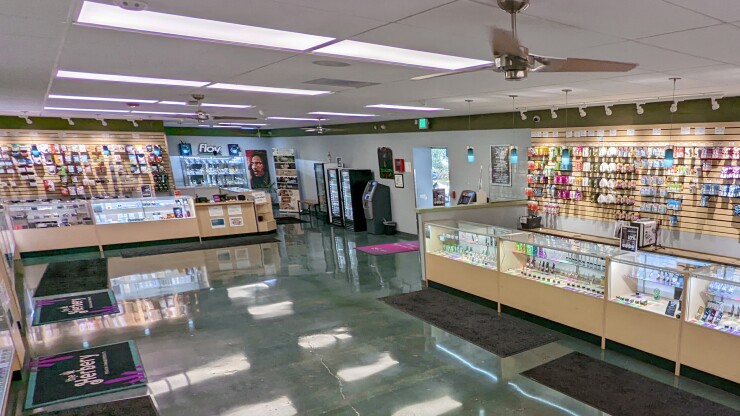Earlier this year, a series of armed robberies at marijuana dispensaries in Tacoma, Washington — including one where an employee was fatally shot — served to illustrate the continued risks which all dispensaries face when it comes to receiving predominately cash payments for cannabis.
While recreational cannabis use has been legalized in 19 states in the U.S., it remains illegal at the federal level. Because of this distinction, the major card networks and most banks won't handle payments for legal dispensaries, so a large proportion of transactions remain cash based.
"The amount of cash that we receive in daily is more than most businesses would be comfortable with," said Sara Eltinge, CEO of The Herbery dispensary chain in Vancouver, Washington. "It leads to dispensaries being targets for robberies. You're continuously pulling money out of the tills so that you're not as big of a target, and ensuring that you've got regular armoured car service pickups every few days."
The legal cannabis industry has long attracted innovators that seek to offer cash alternatives, typically by
Providers such as CanPay (which The Herbery uses) and Aeropay have attempted to ride the
"All of our consumers are not looking for a card. They don't pull out their wallet to pay with something, they pull out their phone," said Dustin Eide, CEO of CanPay. "I think that is an innovation, because we have an opportunity to interact with the consumer every time they want to make a payment. That doesn't exist in traditional payments because of the need to be card-based."

Eide predicts that CanPay's users will more broadly adopt digital payments. Aeropay, which entered the cannabis payments space in 2020, also partners with more than 100 businesses across the U.S. in gaming and cryptocurrency.
These systems have proven popular with merchants. CanPay is now used by more than 100,000 consumers at over 800 dispensaries across the U.S. The company says it has processed over $600 million in transactions in states where cannabis is legal.
"We've been forced to do things differently," Eide said. "In any other industry, it would be like, 'ACH is slow, nobody uses it.' But in the cannabis industry, the advantage is that you can do things in a way that's transparent. All of our merchants transact in their own DBA Name, that's what shows up on the customer's bank statement, which allows for stable, compliant, legitimate transparent payments."
According to Eide, the digital system makes it easier to handle any issues at the point of sale such as declined payments, because it comes with an embedded live chat option, meaning that consumers can immediately contact a CanPay employee. He also argues that it is a more secure method of payment as the point of sale is a single-use QR code which expires within 30 minutes.
However, while dispensaries are appreciative of these novel technologies, they say that they are still only used by a minority of cannabis consumers.
"CanPay is a wonderful product, but it doesn't help enough to move the needle in our cash-heavy security issues," Eltinge said. "The consumer still has to be willing to take the time to get it on their phone and link it to their bank, and a lot of people are still wary of having a phone linked to a bank account."
Eltinge suspects that if cannabis does eventually become legalized by the federal government, the major card networks would quickly usurp digital methods. This is essentially what happened in Canada, when
"I think those already using CanPay would keep using it," she said. "I don't know if they would continue to acquire new customers, which would be a shame. They were willing to find a solution when Visa and Mastercard were not."
However cannabis payment providers themselves are confident that they would still thrive, even in the wake of legalization.
Eide points to the issue of cost, claiming that it would be cheaper for merchants to offer ACH payments via CanPay compared to Visa and Mastercard, particularly as cannabis is perceived as a high-risk industry. He predicts that there may even be a possibility of partnering with the card giants.
"If Visa and Mastercard came to us and said, 'Hey, we're going to allow your customers to link a debit or credit card to their CanPay account,' we could do that," he said. "We have the infrastructure; it's just rather than funding from a checking account, it's funding from a debit or credit card."
Aeropay CEO Dan Muller also insists that his company is not apprehensive about more traditional players entering the cannabis space.
"Our goal has always been to create a complementary solution to existing systems," Muller said. "Traditional banks and card networks would still have rules and regulations to play by while managing the challenges of being new to the industry and lacking a complete understanding of the risks. Previously established cannabis payment providers would be able to keep their costs low, and continue to provide compliant services as other solutions are just trying to figure it out."






